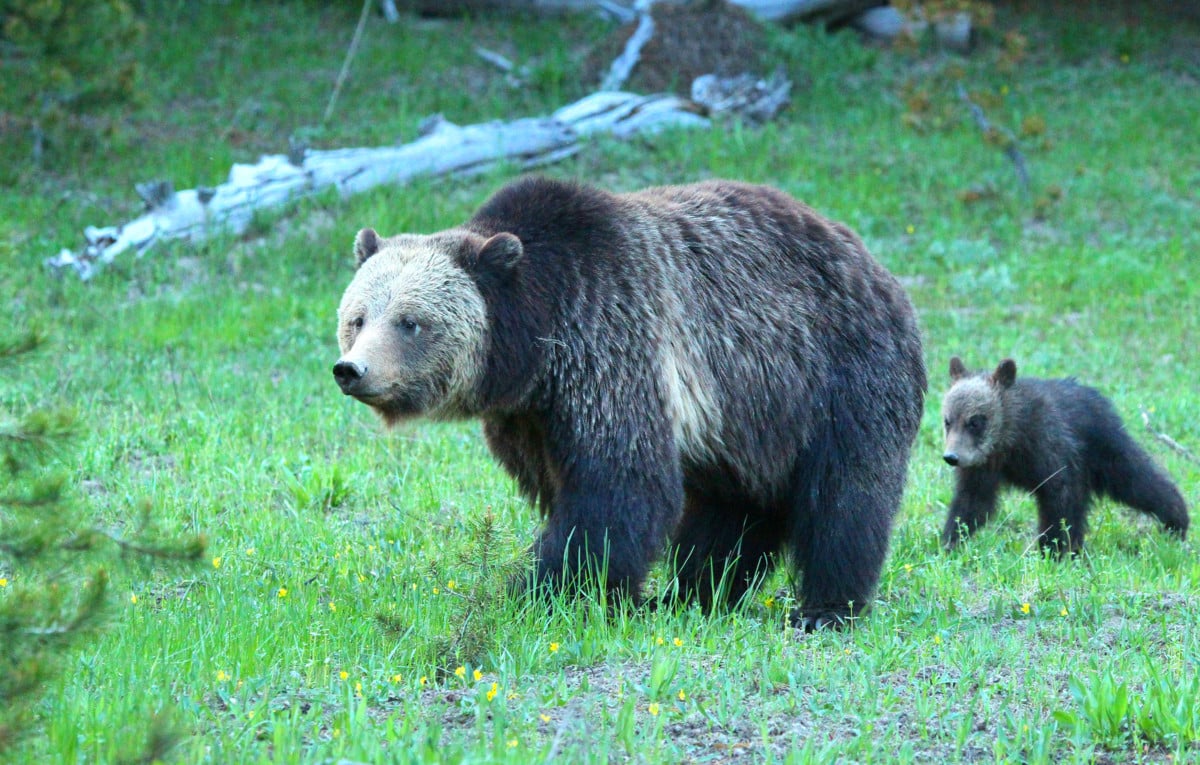Yellowstone National Park’s grizzly bears are safe from hunters for another two weeks while a federal judge decides their fate.
Grizzly bears in the lower 48 states are considered an endangered species that qualify for special federal protections, but the Trump administration stripped the grizzly population in and around Yellowstone of its endangered species status last year.
This opened the door for state agencies to plan grizzly bear hunts, and earlier this year, officials in Wyoming and Idaho voted to allow hunters to shoot and kill up to 23 grizzly bears in and around Yellowstone National Park.
Conservation groups and nine Native tribes intervened with lawsuits challenging the US Fish and Wildlife Service’s decision to remove endangered species protections for the bear population in and around Yellowstone, and a federal court in Missoula, Montana, heard oral arguments in the case on August 30, just two days before the first grizzly bear hunt in 40 years was scheduled to commence.
The court did not issue a ruling that day, so conservation attorneys requested the judge issue an injunction to prevent hunters from killing bears before a decision was made. The court quickly issued an injunction blocking the hunt and agreed to extend it for another two weeks on Thursday while it reaches a final ruling, providing a temporary victory for the bears and their supporters.
“We’re grateful that grizzly bears are not going to be shot under the authority of a rule that we strongly believe is illegal,” said Tim Preso, an attorney with Earthjustice, the environmental law organization that filed the lawsuit and requested the injunction.
In its order extending the injunction, the court says “serious questions” remain about whether the US Fish and Wildlife Service complied with the Administrative Procedures Act and the Endangered Species Act when it delisted the Yellowstone grizzly bears. As Truthout has reported, the courts have repeatedly rejected attempts by the Trump administration to hastily roll back regulations and environmental protections.
Grizzly bears have made a comeback in the Yellowstone region, where the population has grown from 136 when the bears were originally listed as endangered in 1975 to about 690 today, according to the National Park Service.
However, grizzly population growth has tapered off over the past decade, and bears are facing the loss of two important food sources — whitebark pine seeds and cutthroat trout — due in large part to climate disruption, according to Earthjustice. Conservationists warn that grizzlies across the lower 48 have lost 99 percent of their original habitat to development and are at less than 5 percent of their historic population, so taking grizzlies from the Yellowstone area out of the gene pool could threaten the greater population.
Still, the revival of the grizzly bear population in the Yellowstone region has hunting and gun-rights groups such as the National Rifle Association chomping at the bit. They argue the grizzly’s comeback has been a success, and the expanding population has frustrated ranchers. Hunting, they argue, is a conservation tool for thinning bear populations where predators and humans share territory, and fees paid by hunters to wildlife agencies have helped finance the bears’ comeback.
About 7,000 people entered a lottery to win licenses to shoot 23 bears in Idaho and Wyoming. Preso suspects most of them want to kill bears simply to mount them as trophies, and winning the right to do so in Yellowstone would set a precedent for future battles between conservationists and hunters.
“I don’t think very many people are eating grizzly bears,” Preso said.
The Trump administration decision to delist the Yellowstone bears as endangered thus transferred management authority from federal to state officials — part of a larger trend of the federal government relinquishing control over Western lands to state authorities, according to Preso. This has accelerated under Interior Secretary Ryan Zinke, a Trump appointee from Montana.
Earlier this week, Zinke released a sweeping memo initiating a massive transfer of authority over federal lands from federal agencies to state wildlife management and game offices.
The memo directs state agencies to identify federal conservation rules that should be rolled back to reflect weaker state standards. This would put any federal wildlife protection not required by law on a path to being repealed, according to Public Employees for Environmental Responsibility (PEER), an environmental watchdog group representing Interior Department employees and other government workers.
For example, the Trump administration recently moved to reconsider federal hunting restrictions in parks and wildlife refuges in Alaska in favor of state rules that would allow hunters to shoot swimming caribou from motor boats and kill bear and wolf pups in their dens, according to PEER.
PEER President Jeff Ruch said most state wildlife and game agencies get their revenues from hunting and fishing licenses, so Zinke’s order would tip the political scales in favor of hunters.
“This across-the-board abandonment of federal fish and wildlife safeguards is rooted in an ideological stance unsupported by any factual analysis,” Ruch said in a statement. “Federal parks, preserves, and refuges have a mission to protect biodiversity and should not be reduced to game farms.”
Join us in defending the truth before it’s too late
The future of independent journalism is uncertain, and the consequences of losing it are too grave to ignore. To ensure Truthout remains safe, strong, and free, we need to raise $29,000 in the next 36 hours. Every dollar raised goes directly toward the costs of producing news you can trust.
Please give what you can — because by supporting us with a tax-deductible donation, you’re not just preserving a source of news, you’re helping to safeguard what’s left of our democracy.
